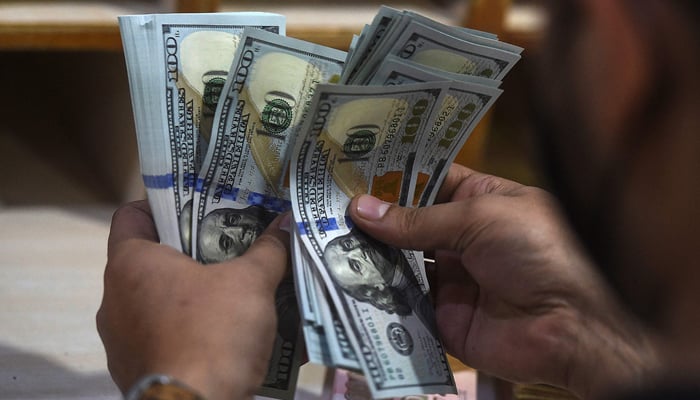Pakistan’s foreign exchange reserves continue to decline unabated
On October 7, foreign currency reserves held by SBP clocked in at $7,596.9 million, down $303 million
KARACHI: In line with the dominant trend over the last several weeks, the country’s foreign exchange reserves held by the State Bank of Pakistan (SBP) once again declined by 3.83%.
On October 7, the foreign currency reserves held by the SBP were recorded at $7,596.9 million, down $303 million compared with $7,899.8 on September 30, data released by SBP showed on Thursday.
Net reserves held by banks amounted to $5,649.9 million. The central bank cited external debt repayment, including interest payments on Eurobonds and repayment of a commercial loan, as a major reason behind the decline.
Overall liquid foreign currency reserves held by the country, including net reserves held by banks other than the SBP, stood at $13,246.8 million.
With the current foreign exchange reserves position, Pakistan has an import cover of fewer than 1.09 months.
Criticising the policymakers, former planning minister and PTI leader Asad Umar said: "We have lost more than half the reserves which were there when [the] no-confidence motion was filed."
"The crises continue to deepen as [the] government [is] too busy getting their corruption cases wound up," he tweeted.
Emerging markets investor Emre Akcakmak warned that if the rolling pace of nearly $1 billion continues, Pakistan's reserves could last for seven months.
“World Bank ($2 billion) and ADB ($2.5 billion) flood-relief funds, as well as further GCC help, required, but Pakistan has to stop reserve bleeding ASAP,” he tweeted.
Pakistan’s economy faces serious challenges due to fast-decreasing foreign exchange reserves and political instability.
Foreign exchange reserves are decreasing by $300-400 million on weekly basis due to an increase in imports and have fallen below $8 billion, which is an alarming situation.
-
Will Warner Bros finalize deal with Paramount or stays loyal with Netflix's offer?
-
$44 billion Bitcoin blunder: Bithumb exchange apologizes for accidental payout
-
Global memory chip crunch puts spotlight on Apple; Will iPhone become more pricey?
-
Bitcoin plummets toward $60,000 as investors dump risky bets
-
Bitcoin crashes below $63K as regulatory pressure and market fears grow
-
Bitwise Crypto Industry innovators ETF: What investors should do in 2026?
-
Nintendo shares slide again as momentum fears grow
-
Gold, silver prices fallen sharply; What’s driving the drop?












